🚀 Nixon’s Ascent: From Political Underdog to President
Tracing Nixon’s journey from Congress to the Oval Office amidst a nation in turmoil.
Richard Nixon’s rise to the presidency was anything but ordinary. Before landing in the Oval Office, he had already carved out a name for himself as a savvy, albeit controversial, political figure. Nixon’s journey began in Congress, transitioned to the vice presidency under Eisenhower, and after a brief hiatus, rocketed back to the forefront during the political whirlwind of the 1960s.
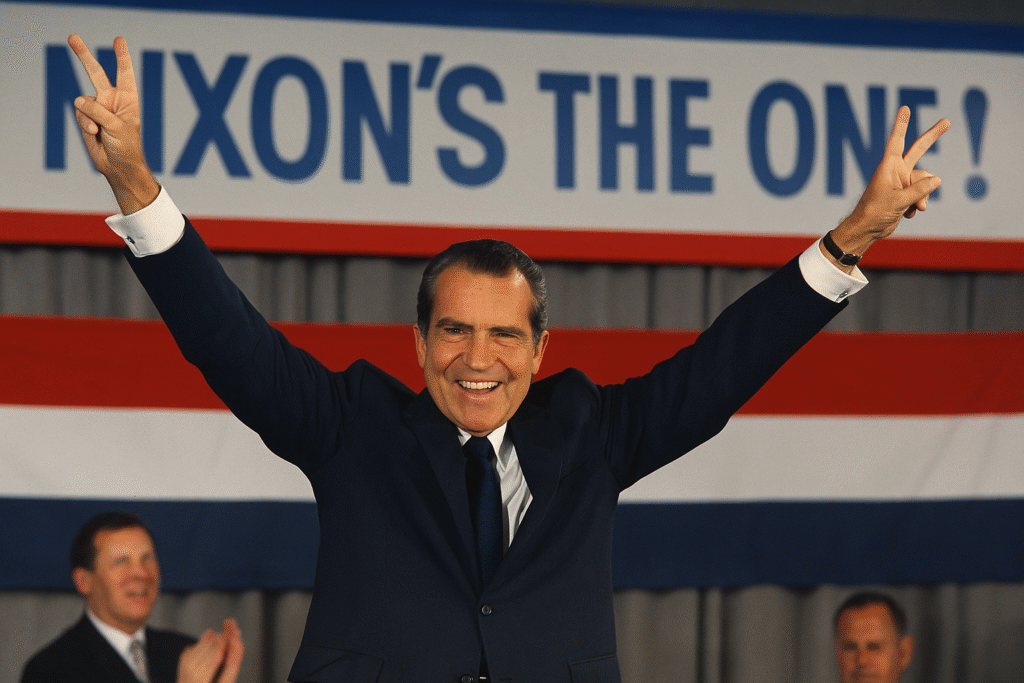
The landscape Nixon stepped into was chaotic. America was in the thick of a cultural revolution, with civil rights movements and anti-war protests shaking the foundations of society. On top of that, the aftermath of failed policies and foreign entanglements loomed over every presidential hopeful. Winning the 1968 election wasn’t just a matter of policy for Nixon; it was a grasp at leadership during one of the country’s most tumultuous times.
Nixon rode the wave of change, promising unity and peace with the campaign slogan ‘Nixon’s the One.’ He proposed a new approach to both domestic policy and foreign relations, capitalizing on the American desire for stability. His electoral victory marked a turning point but came with its own set of new challenges.
🇺🇸 Navigating Domestic Challenges: Economic Reforms and Social Strife
lenges: A Balancing Act
Analyzing Nixon’s domestic policies, including economic strategies and civil rights issues.
Nixon took the reins at a time when the U.S. economy was a rollercoaster ride. Inflation was rising, but he had a determination to keep the ride steady. His economic policies, known as “New Economic Policy,” brought about wage and price controls and took the nation off the gold standard. These moves were designed to tame inflation and reshape monetary policy, altering the path of the U.S. economy in ways that echo to this day.
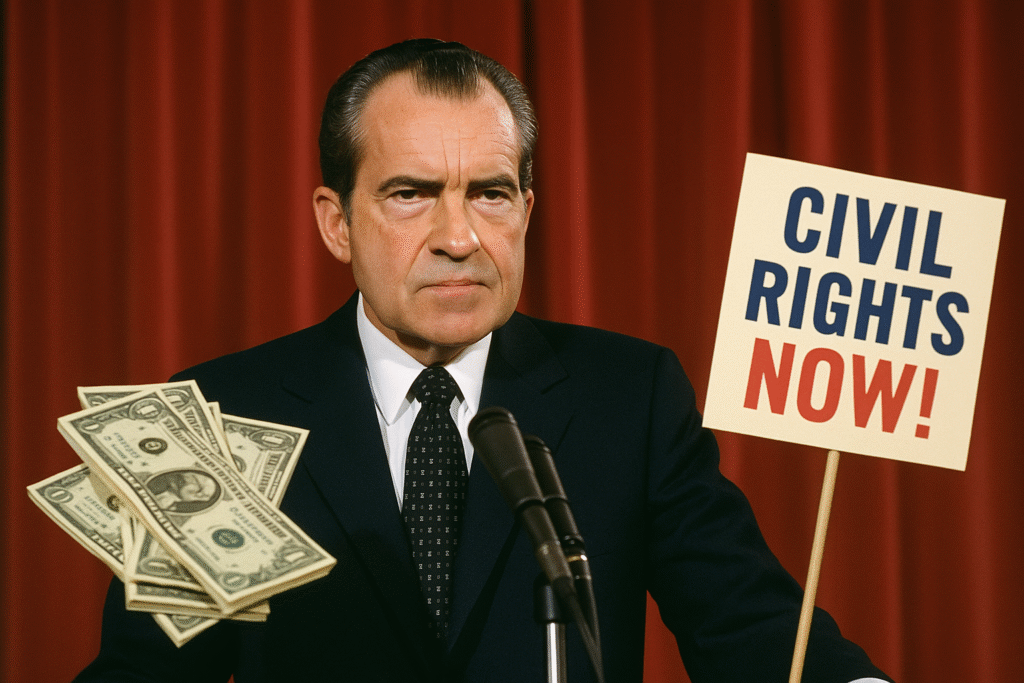
Nixon’s track record with civil rights is a mixed bag. While he signed significant legislation advancing minorities’ rights, his administration also faced criticism for its approach to school desegregation and law and order tactics. The escalation of community tensions and protests laid bare the divisions that continued to persist across the country.
One of Nixon’s undeniable legacies is in environmental conservation. Under his watch, the Environmental Protection Agency was born out of rising environmental awareness. Acting on growing public concern, he pushed forward initiatives that began shaping a national conversation on sustainability and pollution that remains critical today. This was a time when legislation like the Clean Air Act found its footing, proving Nixon’s administration could indeed address domestic issues head-on, even amidst considerable challenges.
🌍 Redefining Foreign Policy: Détente and Diplomatic Milestones and Turmoil on the Global Stage
Exploring Nixon’s international initiatives, from opening China to managing the Vietnam War.
Nixon took the global stage with a clear vision to reshape America’s role in the Cold War. He and Henry Kissinger, his Secretary of State, crafted a strategy of détente, which eased tensions with two of the world’s greatest powers at that time—the Soviet Union and China. His landmark visit to China in 1972 paved the way for improved U.S.-China relations, breaking down decades of isolation and hostility.
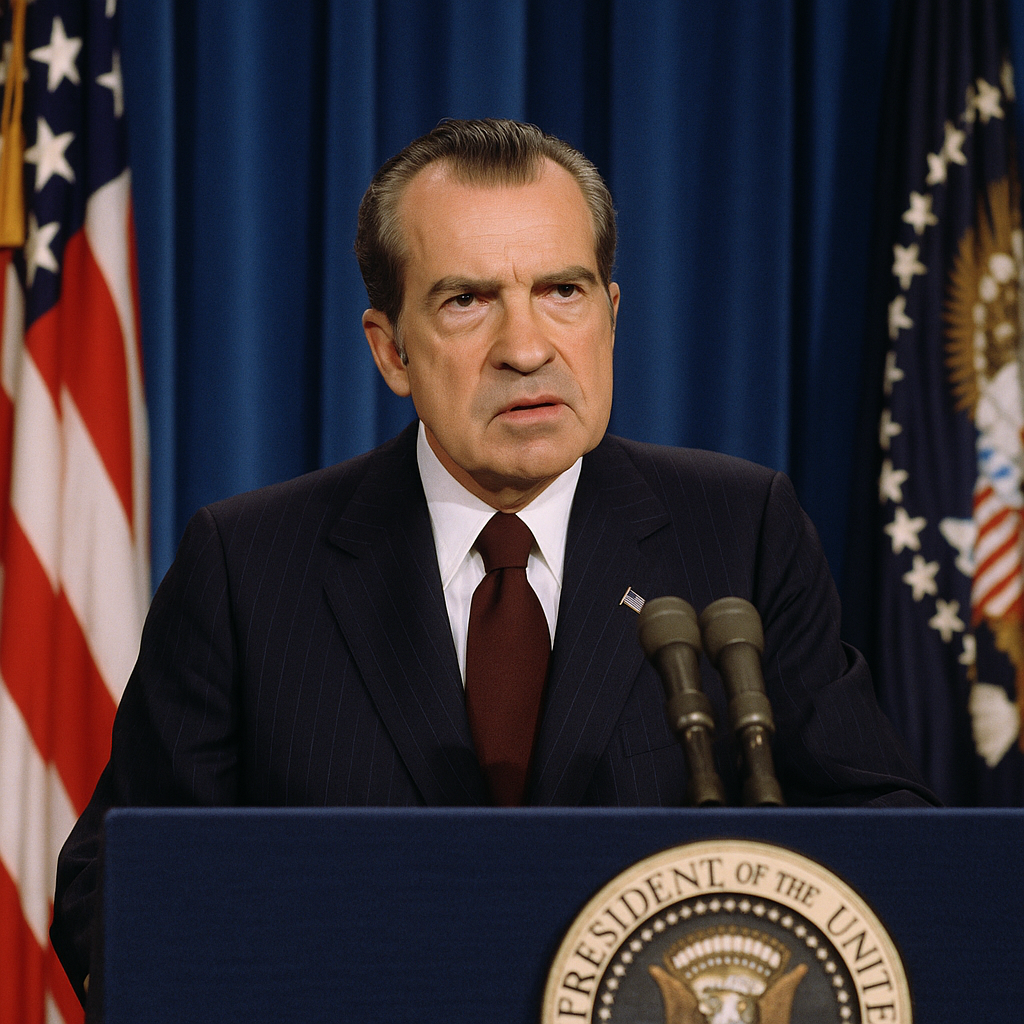
Nixon’s handling of the Vietnam War was another defining aspect of his foreign policy. Faced with widespread domestic opposition to the war, he initiated a policy of ‘Vietnamization,’ aiming to withdraw American troops while empowering South Vietnamese forces to take over combat roles. Though ultimately contentious, this approach marked the beginning of the end for American military involvement in Vietnam.
The Middle East was another focal point, with Nixon navigating a complex web of diplomatic tensions. His administration’s efforts in the wake of the Yom Kippur War in 1973 showcased the U.S.’s growing influence in Middle Eastern politics. The handling of these relationships set the stage for future negotiations and conflicts in the region. Nixon’s foreign policy gambits were bold and set benchmarks that continued to influence American diplomacy for years.
⚖️ Watergate: The Scandal That Shook the Nation
Delving into the events of Watergate and its profound impact on American politics.
The Watergate scandal wasn’t just a political pitfall for Nixon; it was a shocking revelation that rocked the very core of American governance. It all began with a seemingly straightforward break-in at the Democratic National Committee headquarters in 1972. What unraveled was a tangled web of deceit, covert operations, and abuse of power that led right back to the doors of the White House.
As the investigation progressed, it exposed a culture of corruption and dishonesty that forced the nation to confront the integrity of its leaders. The sequence of events, captured in unforgettable congressional hearings, exposed the extent of the cover-up. The relentless pursuit of truth by journalists and investigators peeled back layer after layer of misconduct.
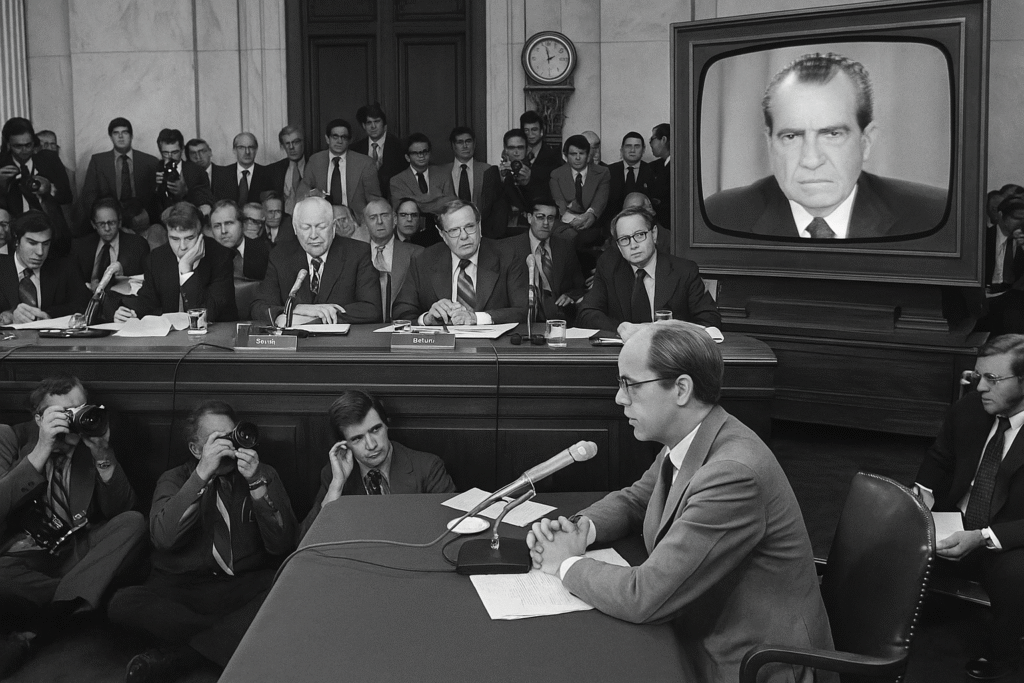
The aftermath of Watergate saw a battered public trust in government institutions, prompting significant political reforms. Legislation aimed at campaign finance transparency and a stronger emphasis on checks and balances emerged. These reforms were intended to prevent a repeat of such a breach of trust and restore faith in democratic processes.
Nixon’s resignation in 1974 was a historic moment, marking the first time a U.S. president resigned from office. It was a move that underscored the lasting impact of Watergate, reshaping the discourse on presidential power and accountability. Nixon’s presidency, stained by this scandal, turned into a lesson in both the dangers of unchecked power and the resilience of democratic systems.
📜 Legacy and Lessons: The Enduring Impact of Nixon’s Presidency
Reflecting on the long-term effects of Nixon’s policies and the reforms that followed.
Although Nixon’s presidency is often remembered most for the Watergate scandal, his time in office left a complex and lasting legacy. His environmental initiatives set the groundwork for decades of regulation. His foreign diplomacy—especially with China and the Soviet Union—reshaped global dynamics. And even the scandals sparked a wave of political reform that continues to influence how American government is scrutinized today.
Nixon’s tenure serves as both a blueprint and a warning. It offers valuable lessons on the limits of power, the importance of institutional trust, and the role of public accountability in democracy. While his presidency ended in resignation, its impact—both constructive and cautionary—remains deeply woven into the fabric of American political life.
💬 What’s Your Verdict on Nixon’s Legacy?
Nixon’s presidency sparked bold reforms, global diplomacy—and historic scandal.
What part of his legacy do you find most surprising, inspiring, or controversial?
Drop your thoughts in the comments—we’d love to hear your take on one of the most complex figures in American political history.
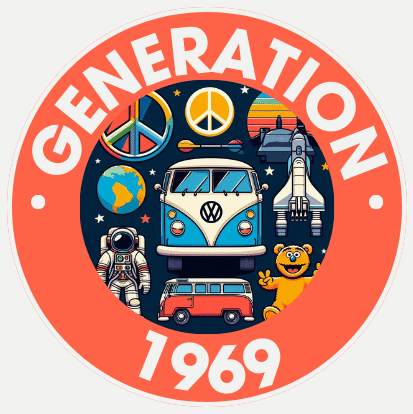
2 thoughts on “Nixon’s Presidency And Its Impact”
Interesting read, and I had to look up if he was a republican or democrat. Not that it mattered. I thing today, we still have a lot of mistrust in the government as a whole. You look at what Trump/Musk has been uncovering. I think that either party, maytbe no party is innocent of causing mistrust for the government. Do you think the Biden administration caused a lot of mistrust as well?
Thanks for sharing your thoughts—really appreciate you engaging with the topic!
You’re absolutely right that mistrust in government didn’t start or end with Nixon (republican). His presidency, especially with the Watergate scandal, definitely deepened public skepticism, but it also set the stage for how we view political accountability today.
As for your question about the Biden administration, I think it depends a lot on perspective and which issues people are most focused on. For some, concerns around transparency, media narratives, or policy decisions may have fueled more distrust. For others, his leadership might feel like a return to a more traditional style of governance. In the end, mistrust tends to grow whenever people feel disconnected from the decision-making process—regardless of who’s in power.
That’s part of what makes Nixon’s legacy so relevant today—it reminds us how fragile public trust can be, and how hard it is to rebuild once it’s broken.
Thanks again for raising an important point—it’s a conversation worth continuing!